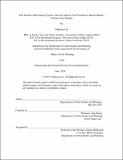Will dockless bike sharing system alter the subway price premium in rental market? : evidence from Beijing
Author(s)
Lyu, Jinghong.
Download1140509324-MIT.pdf (8.080Mb)
Other Contributors
Massachusetts Institute of Technology. Department of Urban Studies and Planning.
Advisor
Siqi Zheng.
Terms of use
Metadata
Show full item recordAbstract
The dockless bike-sharing system emerged in 2016 in China. It achieves door-to-door connection and is thus regarded as an efficient solution to the urban last mile problem. Empirical studies have found that the entry of dockless bikes can flatten the rent price gradient for subway accessibility for 10 Chinese cities on average, yet haven't discussed if this effect also exists in a single city where subway accessibility varies across locations. This study uses difference-in-differences (DID) empirical design to analyze the impact of dockless bike-sharing on Beijing's rental market, and further explores the spatial heterogeneity of such impact. Results show that the rental price gradient flattens slightly for apartments within the 3km radius from a subway station in Beijing. Taking the heterogeneity of development in Beijing into account, the study further finds that the rental price gradient becomes slightly steeper in more developed areas such as North Beijing or Beijing within the 4th Ring Road, and flattens by up to 16% in less developed areas such as South Beijing and Beijing outside the 4th Ring Road. Such impact on rental price gradient is not linear within the 3km radius, where in more developed areas the largest reduction in gradient happens at 1000-2000m, and in less developed areas at 0-500m. The entry of dockless bike-sharing system can generate great social benefits. Switching from walking to biking from homes to subway stations saves about 8.3 minutes of commuting time per trip on average in Beijing, where the most developed area saves 7.24 minutes and the least developed saves 11.8 minutes. Allowing for a 10-min commuting time from homes to subway stations, a tenant would be able to choose from apartments within 800m to subway stations to up to 3km to subway stations. This study contributes to the nascent literature on dockless bike-sharing systems and its impacts on housing rental market, and also yields policy implications for better integrating the bike-sharing system and the existing public transit systems, and the resulted benefit of enhancing housing supply in public transit accessible locations.
Description
This electronic version was submitted by the student author. The certified thesis is available in the Institute Archives and Special Collections. Thesis: M.C.P., Massachusetts Institute of Technology, Department of Urban Studies and Planning, 2019 Cataloged from student-submitted PDF version of thesis. Includes bibliographical references (pages 71-73).
Date issued
2019Department
Massachusetts Institute of Technology. Department of Urban Studies and PlanningPublisher
Massachusetts Institute of Technology
Keywords
Urban Studies and Planning.